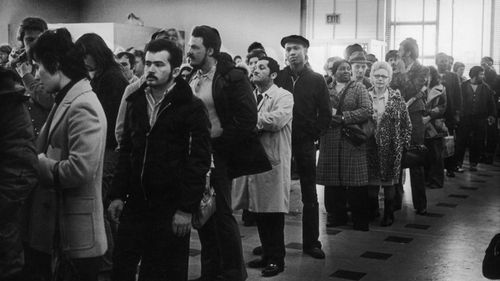50 Years Ago – Crisis and revolution / Just Stop Capitalism
 Crisis and revolution
Crisis and revolution
The Left is saying the crisis is coming; and from that crisis the workers will rise to overthrow, cast off the yoke, destroy the juggernaut of capital, et cetera. There comes to mind, irresistibly, the futile drama of all the times before. The Communist speaker of the ’thirties, proclaiming that civilisation now stood at the brink, imparting to his hearers that the capitalist system was tottering and all that was needed was a good push. Syndicalist doomster in the post-war years, impressively pointing to the approaching crisis as one of capitalism itself: the phrase conveying certainty that the machine would now grind to a halt, its cogs gummed-up with (probably) an excess of the seeds of its own decay.
This continual resurrection of old beliefs is one of the many chronic diseases of the Left. Each generation rediscovers the theories which proved sterile for its predecessors. The failure is never attributed to the error of the theory itself. Those who followed it were “betrayed”, or the time was unforeseeably not ripe; but now it will be written on banners to make the revolution. Yet this theory of the climacteric crisis—“the death agony of capitalism”—and its revolutionary consequence is perhaps the most hopeless of all. What is involved is dual misunderstanding: of the nature of economic crises and the nature of the socialist revolution.
The form of the argument today is as follows. Capitalism is now acutely pressed between a falling rate of profit and workers’ wage demands (…)
The easy assumption is that extreme poverty will make workers rebel against capitalism and flock to “revolutionary” leaders. All the evidence is against it. If it were true the Gorbals, Liverpool, Falls Road and the tied farm cottages of England would be full of revolutionaries. (…) Unpalatable as it may be, what the unemployed worker seeks is work and relief from his acute immediate problem, not to be assaulted further in an ideological battle. (…)
That does not mean conditions are irrelevant. Socialist consciousness starts from indignation at the consequences of capitalism; but until feeling has given way to understanding, consciousness does not exist. The aim of the crisis-struck Left is to foster blind revolt, from which not Socialism but only defeat and disillusionment can result. The real need is for working men and women to comprehend that, in or out of crisis, the capitalist system must always frustrate hopes of a satisfactory life.
(Socialist Standard, March 1973)
Just Stop Capitalism
At the‘Just Stop Oil’ public meeting advertised at my local University, the speakers argued for ‘direct action’ to halt the use of fossil fuels. To a rapt, mainly student audience they listed a series of direct action campaigns, for example Civil Rights, Anti-Apartheid, Occupy, Extinction Rebellion, Insulate Britain, which Just Stop Oil was following in the wake of. Supporting their campaign was, they insisted, the only way to deal with climate change, to save the environment and to save the world.
The first thing to say is that single-issue actions like this are nothing if not commendable for their concern for human welfare and their sincere intentions. They really are trying to make the world a better place. But can a campaign like Just Stop Oil hope to succeed in its objectives? And, if it does, how much will actually be changed? It may be said that some of the previous protest activities mentioned by the speakers have had some impact on society and on social attitudes and it is possible that the changes advocated by Just Stop Oil, if adopted, might help to alleviate climate change. However, sad as it may be, that will not happen with the aim of saving the world but only if the system of production for profit which rules the world sees it as necessary for its own survival and entrenchment.
This same rule applies to all the ‘single issues’ that groups of people get together to try and resolve within the system we live in. This is a system which exists to make profits for the small minority who own and control the bulk of the wealth with the vast majority owning nothing but their energies and skills which they need to sell to survive. So all the time, effort and energy expended by the speakers at the Just Stop Oil meeting will have one of two inevitable outcomes. Either they will be unsuccessful because, whatever the rationality of their arguments or the sincerity of their cause, the system continues to privilege the use of fossil fuels rather than other forms of energy as a way of making profit. Or they will be successful in the sense that the use of oil may be moderated or even halted because the capitalist system itself dictates the necessity of doing this for its own survival. But whichever of these outcomes prevails, the system which has produced this problem and produces the manifold other problems which beset humanity will continue and the end of fossil fuels will just be the latest in a list of never-ending reforms that capitalism has always needed to implement to facilitate its operation.
A wider view of how society works than adopted by single-issue campaigners is needed. One that focuses not on individual social or economic change but on a complete change from a society of production for profit to one of production for need based on common ownership of the world’s resources and free access to all goods and services. So don’t just stop oil, stop capitalism.
SOUTH WALES BRANCH
